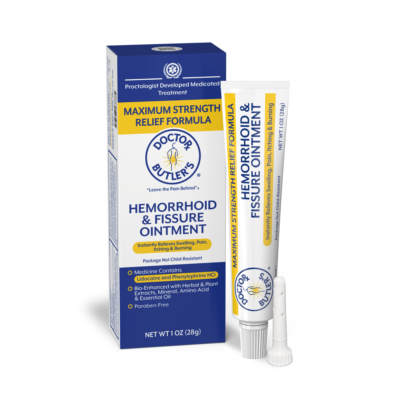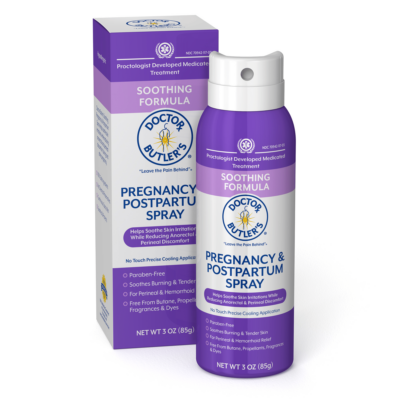Like so many things pertaining to our bodies, we don’t even think about the existence of hemorrhoids until they become a problem. But rest assured, once hemorrhoids are a problem, there’s not much else you’ll think about! What are hemorrhoids, and more importantly, what causes them? Keep reading to get the 411 on why hemorrhoids can happen to anyone and how to prevent hemorrhoids once armed with this knowledge.
Who are we? We’re Doctor Butler’s, experts in down-there care of hemorrhoids and related conditions. We make proctologist-developed hemorrhoid ointments and complementary products to help you quickly leave the pain behind. Dr. Robert Cutler medically reviews all of the information here.
Very helpful
Very helpful
Verified ReviewerCommon Causes of Hemorrhoids
Hemorrhoids, or piles, are swollen veins in your lower rectum or in and around the anus (hence external and internal hemorrhoids). Once irritated, they can spur bothersome symptoms including itching, pain, soreness, and bleeding. The source of the swelling can stem from any number of factors that place extra strain on the rectal veins.
These are the common causes of hemorrhoids. Each one is expanded on below:
- Chronic Diarrhea or Constipation
- Sitting on the Toilet for a Long Time
- Straining During Bowel Movements
- Regularly Lifting Heavy Objects
- Eating a Diet Low in Fiber
- Being Genetically Predisposed
- Anal Intercourse (can make them worse)
- Stress and Anxiety
- Being Overweight
- Pregnancy
Chronic Diarrhea or Constipation
Both sitting and straining for prolonged periods of time will contribute to the formation of hemorrhoids by placing added pressure on the hemorrhoid tissue. Unfortunately, chronic constipation and diarrhea usually mean we’re doing just that. So, you may find yourself with signs of hemorrhoids fairly quickly if you suffer from either of these gastric plights. It’s important to locate the root cause of constipation or diarrhea, so that you may treat the issue at the source before the hemorrhoid symptoms have a chance to appear.
Sitting on the Toilet for a Long Time
As we mentioned above, sitting down is what causes hemorrhoids to pop up. While we’d like to pretend that stomach issues are solely to blame, long periods of time scrolling on our phones can also spell an extended stay on the toilet. Eliminating this extra time on our backside means reducing the pressure being placed on the hemorrhoidal tissue. When you have to pee, leave the phone be!
Straining During Bowel Movements
You don’t have to be experiencing a chronic issue to encounter a strenuous bowel movement. Even if they occur from time to time, any strain during a bowel movement causes the blood flowing through the area to slow, known as pooling, and puts you on the path to hemorrhoids. Straining should not be a regular or even casually occurring part of your bathroom-going experience. It’s important to examine what’s leading to the strain as part of an effective hemorrhoid prevention plan.
Regularly Lifting Heavy Objects
Straining from heavy lifting is a similar problem to bathroom-related straining. This time, the strain of heavy lifting places pressure on the internal organs and veins near your rectum, precisely where hemorrhoids call home. If you’re lifting heavy objects frequently, any measures that can be taken to lessen the pressure on your body will go a long way toward keeping those hemorrhoids at bay.
Diet Lacking in Fiber
Fiber is an integral part of your bowel movement, and having too little of it causes problems. In fact, it’s good for both hard and loose stools. It retains water and helps soften stools if you’re constipated, and it adds the necessary bulk for looser stools to regain their shape.
Fiber regulates the speed at which your bowel movements make their way through the large intestine, with slow-going stools causing bowel movements that are hard to pass. That slow-going stool causes straining and can lead to hemorrhoids.
Eating a diet high in any form of fiber, like whole grains and beans, will help ensure your stool is fighting (not forming!) a hemorrhoid habit.
Being Genetically Predisposed
Genetics aren’t typically listed as the main cause of hemorrhoids, and this is for good reason. Even if other family members suffer from hemorrhoids and you possess the genes for weakened colorectal muscles or connective tissue, this is not a guarantee that you’re cursed with hemorrhoids for life. Remaining vigilant in the many available steps on how to prevent hemorrhoids can go a long way in counteracting complications from genetically compromised muscles and cartilage.
Anal Intercourse
Can you get a hemorrhoid from anal intercourse? In short, no. Anal intercourse will not cause a hemorrhoid itself, but it can create friction that irritates existing hemorrhoids. Using a sufficient amount of lubricant will decrease this risk.
Stress and Anxiety
As with almost any ailment, you don’t have to look far to find that stress is a main contributor. Hemorrhoids fall right in line, as stress and anxiety prompt us to tighten our sphincter muscle, placing just the sort of pressure on the rectum that leads to hemorrhoids.
Stress can also affect our food choices, and the digestive and gastric issues that flare up as a result of the lack of nutrition will encourage the same. For these reasons, stress can cause hemorrhoids, so it is important to be aware of when you’re feeling stressed and find ways to relax so you can decrease your risk of getting, or worsening, your hemorrhoids.
Being Overweight
Carrying excess weight places undue pressure on the body, and as we’ve learned, pressure means strain, and strain spells hemorrhoids. Extra weight around the abdominal region in particular is linked to the deterioration of the supporting tissues of the anal canal that help keep hemorrhoids at bay.
Getting Older
As we age, parts of our body naturally begin to weaken and stretch. This includes the connective tissue between the anus and the rectum and explains why older people are more susceptible to hemorrhoids. The stress of chronic constipation or other stomach issues may also play a role, as the accumulated wear and tear on this region takes its toll.
Pregnancy
Pregnancy and hemorrhoids tend to go hand in hand, and for a good biological reason (though that doesn’t make them any easier to deal with). Pressure from the growing and enlarged uterus and the increased blood flow to the area both cause veins to swell. Hemorrhoids most commonly form in the third trimester when weight is the greatest.
And as pregnancy hormones are also known to slow down your bowels, the resulting constipation is another factor that increases the likelihood of hemorrhoids. All this, and we haven’t even gotten to the strain of the labor itself! Including steps for prevention as part of your pre-and postnatal care goes a long way in tackling hemorrhoids during pregnancy.
Highly recommend for postpartum!
Soothing and simple! Add this to your cart!
Verified ReviewerFast Hemorrhoid Treatment With Doctor Butler’s
Hemorrhoids are said to affect over half the population by age 50, according to research. Being knowledgeable about what causes hemorrhoids is instrumental in identifying when you may be at risk and what you can do to reverse course. You’ve just learned about the different factors that can lead to the formation of hemorrhoids, and the ways to both prevent and treat them. Hemorrhoids happen, and Doctor Butler’s is here to support all stages of prevention, treatment, and care.


